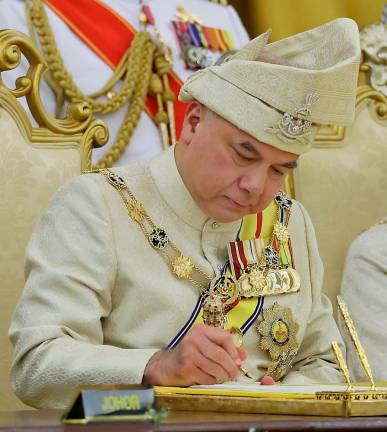CAPITAL punishment, also known as the death penalty, is still relevant and should remain enforced in Malaysia, especially when it comes to deterring serious and hideous crimes such as murder and drug trafficking.
Recently, the government agreed to abolish the mandatory death penalty, giving a judge discretion when it comes to sentencing.
Minister in the Prime Minister’s Department (Parliament and Law) Datuk Seri Wan Junaidi Tuanku Jaafar said the decision was reached after he presented a report on substitute sentences for the mandatory death penalty at last Wednesday’s Cabinet meeting.
He added that the Cabinet had also agreed to a further study being carried out on the proposed substitute sentences for 11 offences carrying the mandatory death penalty, including Section 39B of the Dangerous Drugs Act 1952 (Act 234).
The government should reconsider their position or plan to abolish it as it can be used to not only deter criminals from committing crimes, but also give people a sense of justice for the crimes that were committed.
Punishments befitting crimes should be meted out on criminals and there should not be any compromise on the matter.
Capital punishment is a state-sanctioned practice of killing a person as a punishment for a crime.
This form of sentence is known as a death sentence and the act of carrying out the sentence is known as an execution, with convicts commonly referred to as being on death row.
As of 2022, 54 countries in the world have retained capital punishment, 108 countries have completely abolished it for all crimes, seven have abolished it for ordinary crimes (while maintaining it for special circumstances such as war crimes) and 26 are abolitionists in practice.
Although most nations have abolished capital punishment, over 60% of the world’s population live in countries where the death penalty is still enforced such as China, India, parts of the US, Singapore, Indonesia, Pakistan, Bangladesh, Nigeria, Egypt, Saudi Arabia, Iran, Japan and Taiwan.
The idea behind capital punishment in Malaysia arose from a mix between the common law system that Malaysia inherited during the period of British colonisation and the use of capital punishment in Islam.
The death penalty is currently retained for 33 offences in Malaysia that include murder, drug trafficking, treason, acts of terrorism and waging war against the Yang di-Pertuan Agong, which are carried out by hanging.
Section 277 of the Criminal Procedure Code states that, “When any person is sentenced to death, the sentence shall direct that the person be hanged by the neck until he/she is dead, but shall not state the place nor time when the sentence is to be carried out”.
However, there are exceptions to this ruling. According to Section 275 of Criminal Procedure Code, a death sentence shall not be passed on pregnant women.
Furthermore, according to Section 97(1) of the Child Act 2001 (Act 611), “A sentence of death shall not be pronounced or recorded against a person convicted of an offence if it appears to the Court that at the time when the offence was committed, the person was a child”.
Abolishing the death penalty has raised concern that without having strict capital punishment, the number of crimes will increase and affect society, with more innocent people becoming victims.
Keeping the sentence is a more suitable deterrent in preventing such crimes from being committed in the first place.
Over the years there have been many debates regarding abolishment of the death penalty not only in Malaysia, but globally.
There are pros and cons over the proposal to abolish it, with proponents of the death penalty arguing that it is an important tool for preserving law and order within society as well as in deterring crime.
The same group also argue that retribution or “an eye for an eye” honours the victim, helps console grieving families and ensures that perpetrators of the crime never get the chance or opportunity to inflict more injury or suffering on others.
On the other hand, the opponents of capital punishment argue that such punishment has no deterrent effect on crime in society and is morally wrong when governments are given the power to take a human life.
For them, lifetime imprisonment is a more severe form of punishment than the death penalty.
However, given that crimes still occur to this day, the government needs to reconsider its position on abolishing the death penalty.
They need to establish a special committee to analyse and carefully study their intention to abolish it before coming to a final decision on the matter.
The committee should comprise people who are experts, such as judges and lawyers, academicians, relevant non–governmental organisations and concerned individuals, including family of victims.
The government needs to weigh their options carefully on such an important issue and should never rush to come to decision.
Muzaffar Syah Mallow is an associate professor at the Faculty of Syariah and Laws (FSU) in Universiti Sains Islam Malaysia (USIM). Comments: letters@thesundaily.com










